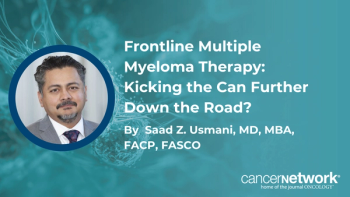
Oncology NEWS International
- Oncology NEWS International Vol 4 No 6
- Volume 4
- Issue 6
NCAB Outlines Major Issues US Cancer Program Must Address
WASHINGTON--By the end of the century, cancer will surpass heart disease as the leading cause of death in the United States. According to a report to Congress from the National Cancer Advisory Board (NCAB) Subcommittee to Evaluate the National Cancer Program, if the nation fails to address six major issues (see table "the resulting health-care costs, lost productivity, and personal tragedy [will be] staggering."
WASHINGTON--By the end of the century, cancer will surpass heartdisease as the leading cause of death in the United States. Accordingto a report to Congress from the National Cancer Advisory Board(NCAB) Subcommittee to Evaluate the National Cancer Program, ifthe nation fails to address six major issues (see table "theresulting health-care costs, lost productivity, and personal tragedy[will be] staggering."
The report from the subcommittee, chaired by Paul Calabresi, MD,professor and chairman emeritus of the Department of Medicine,Brown University School of Medicine, elaborated on these six issues,stressing that they must be considered when any future health-carereform legislation is written.
Too Many Cooks?
An absence of coordination of the National Cancer Program resultsin research and service gaps and costly duplication of effort,the report said. For example, 12 agencies in the Department ofHealth and Human Services are involved in cancer-related research,care, or regulation. Participation by hundreds of state, local,and nongovernment agencies and organizations further confusesthe issue.
The subcommittee found that many Americans receive inadequatecancer care, especially the poor, elderly, and uninsured. It wasthe opinion of the subcommittee that capitated delivery systemsoften create a barrier to effective cancer care by pitting patients'needs against providers' financial interests.
Problems With Current Laws
The report stressed that current laws, policies, and regulationsthwart the effort to eradicate cancer because cumbersome regulationsand excessive documentation requirements discourage industry fromdeveloping new anticancer drugs and technology. In addition, laws,policies, and regulations protecting tobacco companies worsenthe cancer problem and drive up health-care costs.
The subcommittee report pointed out that failure to support translationalresearch severs the essential bridge that connects basic scienceto improvements in cancer care. If such research continues tobe insufficiently funded by third-party payers under managed careand capitated payment systems, much necessary clinical researchmay never take place, the report warned.
The subcommittee maintains that, "for the first time in cancerresearch history, we are poised to make major inroads into ourunderstanding of the multistep process of cancer onset and spread."This has created unprecedented opportunities in basic research,especially in genetic links to cancer, they said, but inadequatefinancial resources now jeopardize the future of untargeted basicbiomedical research.
National Cancer Advisory Board's Advice to Congress
Include universal access to cancer care coverage in health-carereform legislation, including services provided in qualified clinicaltrials.
Coordinate research and cancer care activities in the public,private, and voluntary sectors.
Stabilize and strengthen the basic research infrastructure andthe cancer care delivery system.
Change government policies and industry practices that underminecancer prevention and control.
Develop ways to disseminate cancer information to the underserved.
Strengthen mechanisms to fund translational research.
Articles in this issue
over 30 years ago
IDEC-C2B8 Antibody Is in Phase III Testing for B-Cell Lymphomaover 30 years ago
Dr. Peters Named Head of the Michigan Cancer Foundationover 30 years ago
Broad-Spectrum Sunscreens Block UVA and UVBover 30 years ago
Trials of AccuSite Injectable Gel From Matrix Begin in Basal Cell Caover 30 years ago
Outpatient ABMT at Duke Leads to Savingsover 30 years ago
Algorithm Optimizes Value of CA125 II Screening for Ovarian Caover 30 years ago
Better Ovarian Cancer Outcome With IP Cisplatinover 30 years ago
Epirubicin Effective But Toxicity Is IncreasedNewsletter
Stay up to date on recent advances in the multidisciplinary approach to cancer.






































